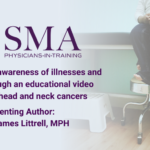Abstract | May 5, 2021
Raising patient awareness of illnesses and vaccines through an educational video platform on head and neck cancers
Learning Objectives
- Gain an understanding of the knowledge, attitudes, and practices among patients regarding head and neck cancers;
- Understand the role that patient awareness may play in receiving vaccines to prevent various illnesses, such as cancer or COVID-19;
- Consider wide-spread implementation of patient educational platforms through various academic hospitals.
Introduction
Each year, more than 50,000 new cases of oropharyngeal cancers are diagnosed.1 Studies have shown that early detection and treatment can help improve patient outcomes. If the cancer is localized, the 5-year survival rate is 86% as compared to 36% in those with metastases.1 However, it is challenging to detect head and neck cancers early if patients are unaware of risk factors and symptoms that may warrant a physician follow-up. One study reports that American adults have limited understanding of head and neck cancer risk factors, such as tobacco use and HPV.2 Therefore, efforts to increase patient awareness are being studied. One study successfully implemented community-focused educational sessions in faith-based communities to improve knowledge about the link between HPV and head and neck cancers.3 However, few studies have assessed the efficacy of using an educational video to help increase awareness of head and neck cancers in the general population. We expect that implementing an educational video can help improve patients’ understanding of head and neck cancers and HPV vaccines.
Goals
Through this project, we aim to study and improve the knowledge, attitudes, and practices regarding head and neck cancer risk factors among the general population of New Orleans. We will implement an educational platform that involves an educational animated video and pre-survey and post-surveys to assess patients’ knowledge, attitudes, and practices. In the future, we aim to share this educational platform with various institutions
Though our study focuses on educating patients about head and neck cancers and the HPV vaccine, this study is also an opportunity to gain a better understanding of patient awareness regarding vaccines in general. This is particularly relevant in the midst of the COVID-19 pandemic, in which patient awareness may play an important role in influencing patients to receive a new vaccine. Ultimately, we aim to increase vaccination rates among underserved populations.
References and Resources
- Siegel RL, Miller KD, Jemal A. Cancer Statistics, 2019. CA Cancer J Clin. 2019;69:7-34. Published 2019 Jan 11.
doi:10.3322/caac.21551. Accessed 2019 Jun 4. - Luryi AL, Yarbrough WG, Niccolai LM, et al. Public Awareness of Head and Neck Cancers: A Cross-Sectional Survey. JAMA Otolaryngol Head Neck Surg. 2014;140(7):639–646. doi:10.1001/jamaoto.2014.867
- Weinstein JE, Ananth A, Brunner JP, et al. Efficacy of a Human Papillomavirus Vaccination Educational Platform in a Diverse Urban Population. JAMA Otolaryngol Head Neck Surg. 2016;142(6):590–595. doi:10.1001/jamaoto.2016.0433 Accessed 2019 Jun 7.

